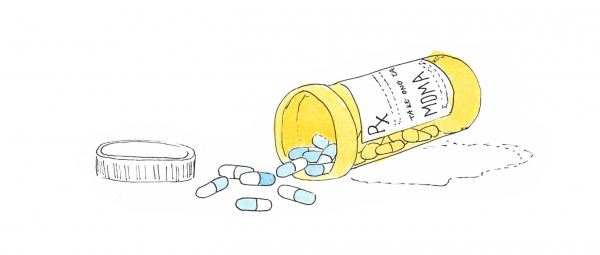Canadian Students for Sensible Drug Policy (CSSDP) is currently applying for funding to launch a pilot project that will provide free drug-testing kits to McGill students. At the moment, the McGill-based student group is collecting data through a survey that they released to the student body on Oct. 31. The responses will allow the club to measured demand for specific kinds of drug-testing and to complete their one-time funding application to the Students’ Society of McGill University (SSMU).
The McGill Tribune met with Matthew McLaughlin, U2 Arts, and Gabriel Aboutboul, U4 Arts, co-directors of the CSSDP branch at McGill. McLaughlin had the idea to provide students with free drug-testing kits during his term as SSMU Vice-President (VP) Internal Affairs in 2018-19, but was only able to undertake the project with the CSSDP after his tenure.
McLaughlin was inspired by universities in the United Kingdom such as Sussex, Newcastle, and Manchester, whose administrations have already funded drug-testing kits. Observing the lack of such services for students in Canada, McLaughlin believed it was time for McGill to adopt them.
“We know students use drugs and will continue to use drugs,” McLaughlin said. […] “The goal should not be to get students to stop using drugs, because prohibition, we know, doesn’t work. Instead, we look at this from a harm reduction standpoint, and we want students to know that what they’re consuming has not been contaminated with adulterants, that they’re consuming something safely.”
The SSMU funding is intended to finance a certain number of kits, the training of around five student volunteers by local harm reduction organizations, and a space from where the pilot project can begin.
“[T]he project […] essentially entails having a space on campus to distribute these kits once a week, [and] having students be able to drop by and speak anonymously,” McLaughlin said. “Essentially, they will tell us what substances they want to be testing and we will give them the reagents they need. [We will] be accompanying every kit with some literature on how to do these [tests] and hopefully holding some workshops […] so [that students] can see in-person how to do it.”
The CSSDP will also provide fentanyl test strips in every kit, allowing students to test for the presence of fentanyl or carfentanil, which are strong opioids that can lead to accidental overdose.
Aboutboul explained that the student group is looking to purchase drug-testing kits from several online and physical stores.
“As of now, the plan seems to be [to buy the kits from] organizations like Dance Safe, […] an organization in Canada that distributes […] reagent kits [in bulk],” Aboutboul said. “We plan to separate these bulk sizes into [smaller kits], and then be able to distribute them that way to students.”
By talking to existing harm reduction organizations in Montreal such as Flying Safe and GRIP, and Project Safe Audience in Winnipeg, McLaughlin and Aboutboul realized that their pilot project should aim to do more than just provide free tools for safer drug use.
“It’s also about interacting with students and learning about the types of drugs they use, what drugs they mix with one another, and advising them,” Aboutboul said. “It’s a way to obviously reduce harm by giving a kit but also [to create] relationships with people and [give] them some kind of advice, and this is obviously a better path than prohibition.”
In an email to the Tribune, McGill Student Emergency Response Team (MSERT) Director of Training Alberto Sobrero expressed his support for the CSSDP’s initiative.
“MSERT is supportive of harm reduction initiatives and projects that aim to keep members of the McGill community safe,” Sobrero said. “[I]t seems to be a good harm reduction initiative and potentially very valuable for individuals who may be experimenting [with drugs] for the first time and who wish to do so safely.”
If the pilot project is successful, the CSSDP hopes to fund their project long-term through a renewable, opt-outable fee between $0.25 and $0.35 each semester, and will use its survey data to estimate the required funds.
In the long-term, the CSSDP is hoping to inspire other universities across Canada and beyond, as its national body also has chapters across Europe and the United States.
“I don’t think students should have to gamble whenever they’re taking a substance,” Aboutboul said. “People […] choose to take a substance and they should be allowed to know what’s in it [….] Providing the service is a way to make sure that that is a given for every person that chooses to [use drugs].”








